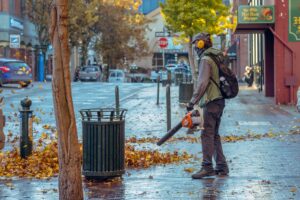By Sharon Longo, Contributing Writer

REGION – Hammers pound, a train passes by, a car horn blasts, a lawn mower hums; sounds like a typical noisy day, or could this be something more insidious? According to the U.S. Environmental Protection Agency (U.S. EPA) and the World Health Organization (WHO), over an eight-hour period, noise levels should be maintained below 75 decibels (dB). An example of a sound level at 85 or higher would be a food blender, a train passing or a gas-powered leaf blower. According to the Centers for Disease Control (CDC), exposure to this type of sound for two hours or longer may cause hearing damage. This is concerning, but the WHO also documented other health areas where noise pollution could pose a problem.
Ailments excessive noise can cause
An intense noise such as a firecracker can cause instant hearing loss that could last permanently, but hearing damage can occur over time due to continued exposure to certain loud sounds. This can interfere with how people understand the spoken word in an average tone of voice. Eventually, communication issues can lead to misunderstandings that can cause relationships to falter. Not being able to understand information, as well as a noisy environment, can cause issues with school or work, leading to errors.
Noise can cause distress and even annoyance. When people don’t like the sound from their outdoor environment, they may close their windows, avoid going outdoors to enjoy their yard, or turn up their radio or television to drown out other noise. This can cause stress and headaches. In some instances, people can become unfriendly, avoiding groups and activities, and eventually this could lead to aggressive behavior or even an increase in depression or anxiety. Something called “noise annoyance” is also a psychological condition that can occur from too much noise on a daily basis.
Not being able to fall asleep or waking up often during the night can be a problem. Noise can be a contributing factor that disrupts these sleep patterns, causing a disruption in deep sleep or the rapid eye movement (REM) stage. A sudden or loud noise also causes the amygdala, the part of the brain that is alerted to danger, to respond. This lack of sleep or “fight-or-flight” response can raise blood pressure, heart rate, pulse rate and even cause an arrhythmia or irregular heart rate.
Who is most affected?
The elderly and children are often affected the most, but others who also have a vulnerability to loud noises are newborns and infants, people who are blind, patients recovering from injury or illness or people dealing with physical or mental illness. Studies have also shown that elderly people who did not treat their hearing loss that had already occurred were at a higher risk for dementia.
While not everyone can move to a less-crowded, traffic-free area, there are some things one can do to lower the environmental noise. Carpeting and noise-absorbing curtains are a help. Wearing earplugs when doing any activity with a 65 dB or more level can help prevent hearing damage. This could include attending a concert or a fireworks event. Also, avoid wearing headphones or earphones when listening to music, or at least make sure the volume is at a reasonable level.
When to seek help
Dr. Keith Darrow is a neuroscientist and clinical audiologist with a Ph.D. from the Massachusetts Institute of Technology (M.I.T) and Harvard Medical School program. On his website, https://www.askdrdarrow.com, Dr. Darrow recommends having a hearing check at age 50. Starting with a baseline check can help detect problems and also prevent other issues. He states that treating hearing loss early helps a person utilize the hearing they have while possibly adapting to treatment at a faster rate.
For more information about noise pollution and its effects visit: https://www.cdc.gov/niosh/topics/noise/faq.html.
RELATED CONTENT:
Slowing down the aging process may not be as hard as you think (fiftyplusadvocate.com)
‘DIY’ healthcare is changing the industry and people’s lives (fiftyplusadvocate.com)
Oral health is key to overall well-being (fiftyplusadvocate.com)












